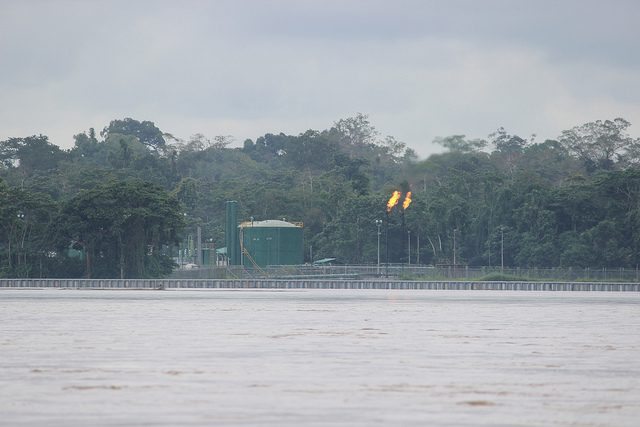
Amazon Watch: Ecuador’s president recently named Marcelo Mata Guerrero to lead the country’s environmental agency. A career oil executive, he is expected to grant an environmental license for new oil drilling deep inside Yasuní National Park—widely regarded as one of the most biodiverse regions on the planet. The project would allow multiple drilling platforms, 200+ wells, pipelines and access roads, and it would threaten the very existence of the Tagaeri-Taromenane indigenous people living there in voluntary isolation.
>>>Urge Minister Mata to protect Yasuní from oil drilling.
Katherine Sacks, FoodPrint: Are you resolving to live in a more eco-conscious way in the new year? Here’s a list of resolutions you can commit to in 2019 to lower your “foodprint.” You could start out small and pick just one. Or pick one for just a month. Or try one once a week. Or, if you are a champion (or a superhero), you could try all seven at once.
>>>7 New Year’s resolutions for a more sustainable 2019.
Caroline Cox, Center for Environmental Health: Glyphosate has been found in over 70 percent of oat-based breakfast cereals served in U.S. schools. Exposing children, with their developing bodies, to a chemical that can cause cancer and hormone dysfunction is wrong. It’s especially wrong for children simply eating breakfast at school, who often are from low-income families.
>>>Tell the CEO of General Mills to get rid of glyphosate in Cheerios and other cereal products by switching to organic oats.
Asha & Jia Kirkpatrick (aged 11 & 8), Leighton Buzzard, UK: Sisters Asha and Jia love orangutans. They are big fans of Orangutan Jungle School on BBC Channel 4. “We were really upset when they saw that the orangutans are being killed and orphaned as their jungle homes are destroyed by companies that want cheap palm oil,” they write in their petition. “We want it to stop now.”
>>>Join Asha and Jia in urging Kellogg’s to stop using these suppliers immediately and to tell the public exactly which palm oil companies they buy from.
Care2: Animals like elephants, rhinos and lions—despite their vulnerable or endangered status—are legally hunted in South Africa. Trophy hunters argue that their activities and the money they pay to take big African game actually creates an incentive for locals to protect these vulnerable species. But according to research by the International Union for Conservation of Nature, trophy hunting has negative impacts on wild populations, and legal hunting and poaching are closely linked.
>>>Urge the South African government to ban trophy hunting.
Alexa Frandina-Brown, PETA: After activists pointed out that more than 150 dogs have died during the Iditarod’s history and that off-season tours keep mushers’ kennels in business, Merit Travel Group—which operates CruiseExperts Travel and AlaskaShoreExperts.com—dropped dogsledding excursions. It’s time for Discover Holidays to join the competition by ending its sale of these activities.
>>>Urge Discover Holidays to remove all dogsledding excursions and replace them with activities that showcase Alaska’s beauty and culture without promoting cruelty.
Parting thought…
“There are no passengers on spaceship earth. We are all crew.” —Marshall McLuhan
Earth | Food | Life (EFL) explores the critical and often interconnected issues facing the climate/environment, food/agriculture and animal/nature rights, and champions action; specifically, how responsible citizens, voters and consumers can help put society on an ethical path of sustainability that respects the rights of all species who call this planet home. EFL emphasizes the idea that everything is connected, so every decision matters.
Click here to support the work of EFL and the Independent Media Institute.
Questions, comments, suggestions, submissions? Contact EFL editor Reynard Loki at [email protected]. Follow EFL on Twitter @EarthFoodLife.